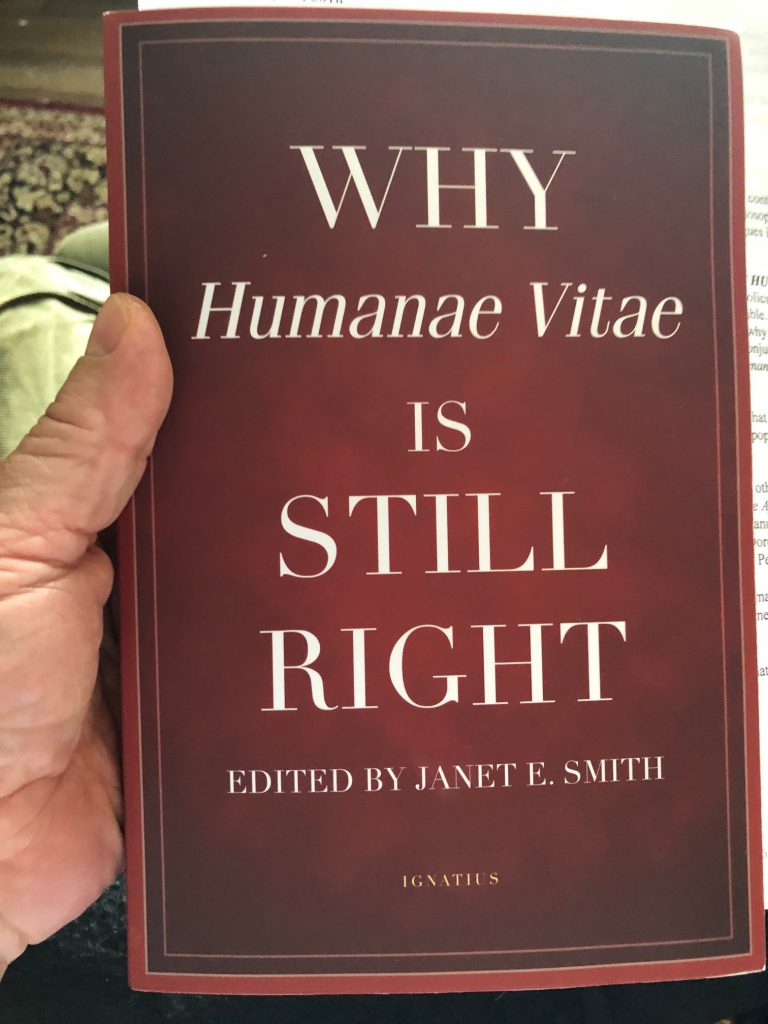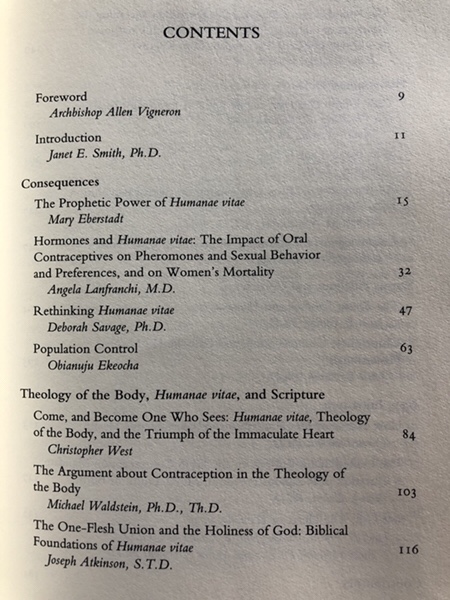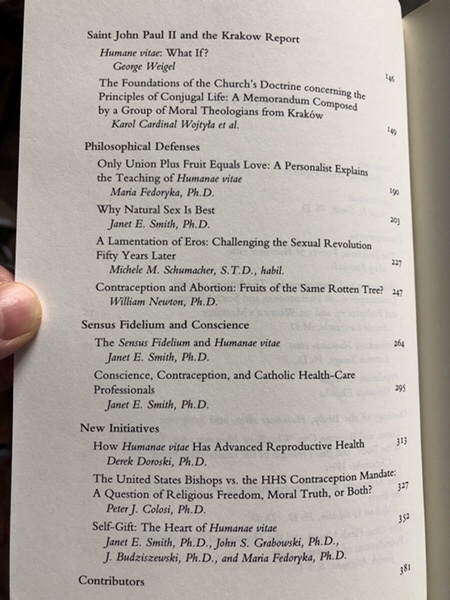I received a copy of the new and timely book edited by Janet Smith. It is, right now, available for pre-order at what I assume is a reduced price.
This is a collection of essays.
Why Humanae Vitae Is Still Right

Here are the TOC pages.


There are some strong contributors herein.
However, there is a serious omission: there is no index. That makes the book less useful as a resource.
Humanae vitae is under attack. This is a welcome contribution.


































Dr. Janet Smith is generally seen as one of the great orthodox voices defending the Church’s traditional teaching on contraception. She also is on the record supporting specific uses of contraception, as she does in this article:
https://www.catholicworldreport.com/2016/02/20/contraception-congo-nuns-choosing-the-lesser-evil-and-conflict-of-commandments/
On the oft-cited, oft-discussed instance of Congo nuns using contraception to protect themselves against rape, Dr. Smith comes down firmly on the side of the nuns.
I can think of other instances where the use of contraception may be justified. (Notice I say may. I am not a moral theologian and would attempt to wrangled into a dispute with one.) For instance, it’s not always just the two persons involved in the act who are morally involved in a contraceptive act. What about doctors, or parents/guardians? They may have to make decisions on behalf of minors in their care, or give advice/consent on such decisions? Are there cases in which an adult may strongly disapprove of a child’s actions, but in which for very particular reasons (i.e. issues involving mental illness, addiction, potential harm to the child conceived) in which that person would be justified in consenting to another’s use of contraception? In that case, a person would not be consenting to the non-marital act, which would of course be sinful.
If there’s an issue with Humanae Vitae, it’s not that it affirmed that contraception is wrong. Humane Vitae does something very specific: affirms the Church’s traditional teaching that contraceptive use of the marital act is gravely sinful. I have not read it in some time, but to my remembrance, Humanae Vitae is not focused on potential issues surrounding contraception outside of the marital act.
In some ways, this is a bit silly – like someone reading, say, Dostoevsky’s Crime and Punishment and complaining that it doesn’t contain any in-depth analysis of 19th century Russian criminal jurisprudence. If person finds fault with what the document is not, then one is likely reading it wrong.
Father Z:
Yesterday I received The Columbia magazine and skimmed through it this morning before work. The July 2018 issue is solely on Humanae Vitae. I plan to read it cover to cover this weekend. There are good articles by Helen Alvare and Elizabeth Kirk as well as a historical timeline of court cases throughout the United States and Canada. There’s also some good points from couples who quit contraception and became more open to life.
It is worth the read. I am one Catholic revert who didn’t embrace the pro life movement until about 18 years ago. Some of these articles may be able to be found at http://www.kofc.org, the Knights of Columbus website. Catholic men need to uphold the Sanctity of Life.
Dr. Evan Lenow is a prof at Southwest Baptist Theological Seminary in Ft. worth. He was recently a guest on my radio show The Bird’s Eye View. He defends and teaches HV as a course at SWBTS! For those who would like an e-copy of the show (I believe that Fr. Z already rec’d one) they can email me at bob.bird@hotmail.com. It is a joy to see this dynamic at work!
dbf223- I would usually agree with Janet Smith, but in the case of the nuns, I think she is wrong. The pill does not work merely by preventing ovulation, as breakthrough ovulation is not uncommon for women on the pill. It has a secondary mechanism which makes the uterine lining hostile to a fertilized ovum. If the pill merely prevented ovulation, I could agree with her point, but since it can also prevent a baby who is already developing from implanting in the womb, I cannot see how it would be permissible for the Pope to give permission for this, if he indeed did. Perhaps this secondary mechanism was not known at the time.